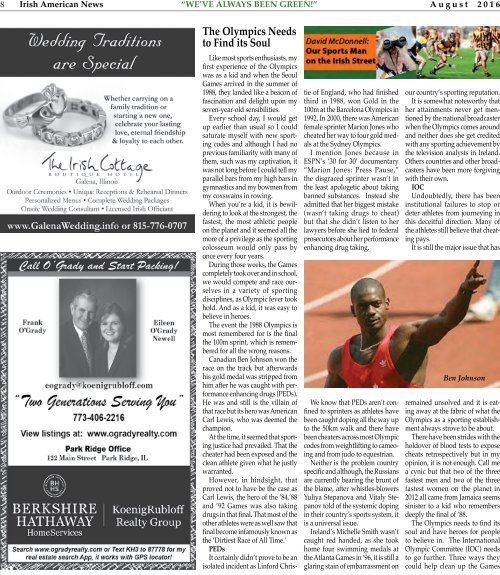You also want an ePaper? Increase the reach of your titles
YUMPU automatically turns print PDFs into web optimized ePapers that Google loves.
8 Irish American News “WE’VE ALWAYS BEEN GREEN!” August 2016<br />
<strong>The</strong> Olympics Needs<br />
to Find its Soul<br />
Like most sports enthusiasts, my<br />
first experience of the Olympics<br />
was as a kid and when the Seoul<br />
Games arrived in the summer of<br />
1988, they landed like a beacon of<br />
fascination and delight upon my<br />
seven-year-old sensibilities.<br />
Every school day, I would get<br />
up earlier than usual so I could<br />
saturate myself with new sporting<br />
codes and although I had no<br />
previous familiarity with many of<br />
them, such was my captivation, it<br />
was not long before I could tell my<br />
parallel bars from my high bars in<br />
gymnastics and my bowmen from<br />
my coxswains in rowing.<br />
When you’re a kid, it is bewildering<br />
to look at the strongest, the<br />
fastest, the most athletic people<br />
on the planet and it seemed all the<br />
more of a privilege as the sporting<br />
colosseum would only pass by<br />
once every four years.<br />
During those weeks, the Games<br />
completely took over and in school,<br />
we would compete and race ourselves<br />
in a variety of sporting<br />
disciplines, as Olympic fever took<br />
hold. And as a kid, it was easy to<br />
believe in heroes.<br />
<strong>The</strong> event the 1988 Olympics is<br />
most remembered for is the final<br />
the 100m sprint, which is remembered<br />
for all the wrong reasons.<br />
Canadian Ben Johnson won the<br />
race on the track but afterwards<br />
his gold medal was stripped from<br />
him after he was caught with performance<br />
enhancing drugs (PEDs).<br />
He was and still is the villain of<br />
that race but its hero was American<br />
Carl Lewis, who was deemed the<br />
champion.<br />
At the time, it seemed that sporting<br />
justice had prevailed. That the<br />
cheater had been exposed and the<br />
clean athlete given what he justly<br />
warranted.<br />
However, in hindsight, that<br />
proved not to have be the case as<br />
Carl Lewis, the hero of the ’84,’88<br />
and ’92 Games was also taking<br />
drugs in that final. That most of the<br />
other athletes were as well saw that<br />
final become infamously known as<br />
the ‘Dirtiest Race of All Time.’<br />
PEDs<br />
It certainly didn’t prove to be an<br />
isolated incident as Linford Christie<br />
of England, who had finished<br />
third in 1988, won Gold in the<br />
100m at the Barcelona Olympics in<br />
1992. In 2000, there was American<br />
female sprinter Marion Jones who<br />
cheated her way to four gold medals<br />
at the Sydney Olympics.<br />
I mention Jones because in<br />
ESPN’s ‘30 for 30’ documentary<br />
“Marion Jones: Press Pause,”<br />
the disgraced sprinter wasn’t in<br />
the least apologetic about taking<br />
banned substances. Instead she<br />
admitted that her biggest mistake<br />
(wasn’t taking drugs to cheat)<br />
but that she didn’t listen to her<br />
lawyers before she lied to federal<br />
prosecutors about her performance<br />
enhancing drug taking.<br />
We know that PEDs aren’t confined<br />
to sprinters as athletes have<br />
been caught doping all the way up<br />
to the 50km walk and there have<br />
been cheaters across most Olympic<br />
codes from weightlifting to cameoing<br />
and from judo to equestrian.<br />
Neither is the problem country<br />
specific and although, the Russians<br />
are currently bearing the brunt of<br />
the blame, after whistles-blowers<br />
Yuliya Stepanova and Vitaly Stepanov<br />
told of the systemic doping<br />
in their country’s sports system, it<br />
is a universal issue.<br />
Ireland’s Michelle Smith wasn’t<br />
caught red handed, as she took<br />
home four swimming medals at<br />
the Atlanta Games in ‘96, it is still a<br />
glaring stain of embarrassment on<br />
our country’s sporting reputation.<br />
It is somewhat noteworthy that<br />
her attainments never get mentioned<br />
by the national broadcaster<br />
when the Olympics comes around<br />
and neither does she get credited<br />
with any sporting achievement by<br />
the television analysts in Ireland.<br />
Others countries and other broadcasters<br />
have been more forgiving<br />
with their own.<br />
IOC<br />
Undoubtedly, there has been<br />
institutional failures to stop or<br />
deter athletes from journeying in<br />
this deceitful direction. Many of<br />
the athletes still believe that cheating<br />
pays.<br />
It is still the major issue that has<br />
Ben Johnson<br />
remained unsolved and it is eating<br />
away at the fabric of what the<br />
Olympics as a sporting establishment<br />
always strove to be about.<br />
<strong>The</strong>re have been strides with the<br />
holdover of blood tests to expose<br />
cheats retrospectively but in my<br />
opinion, it is not enough. Call me<br />
a cynic but that two of the three<br />
fastest men and two of the three<br />
fastest women on the planet in<br />
2012 all came from Jamaica seems<br />
sinister to a kid who remembers<br />
deeply the final of ’88.<br />
<strong>The</strong> Olympics needs to find its<br />
soul and have heroes for people<br />
to believe in. <strong>The</strong> International<br />
Olympic Committee (IOC) needs<br />
to go further. Three ways they<br />
could help clean up the Games


